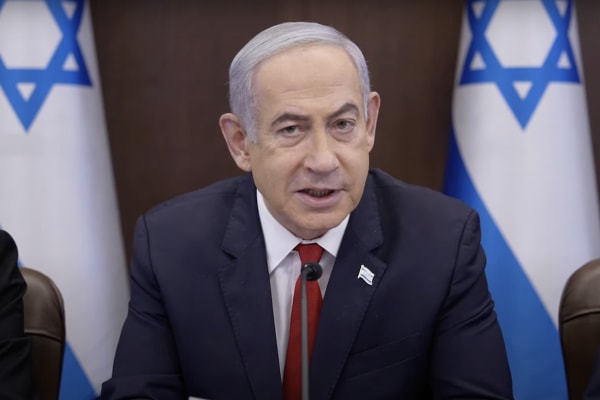Netanyahu declares that Israel will continue fighting under a hostage agreement until the war aims are achieved.

Israeli Prime Minister Benjamin Netanyahu speaks during a cabinet meeting on June 30, 2024 (Photo: Screenshot/GPO)
In the midst of the Negotiations with new energy for a ceasefire and hostage deal between Hamas terrorists and Israel, Prime Minister Benjamin Netanyahu reiterated on Sunday that any deal approved by Israel would allow it to resume fighting until the destruction of Hamas.
The prime minister’s statement came just before a planned assessment meeting to discuss talks on the hostage deal before the Israeli negotiating team is sent back to Qatar.
“The Prime Minister’s firm stance against the attempt to stop the IDF operation in Rafah has prompted Hamas to enter into negotiations,” the statement said, before outlining four principles that Israel will continue to insist on during the talks:
“Any agreement will allow Israel to resume fighting until all war objectives are achieved. There will be no arms smuggling from Egypt to the Gaza border leading to Hamas. There will be no return of thousands of armed terrorists to the northern Gaza Strip. Israel will maximize the number of live hostages released from Hamas captivity.”
“The plan agreed by Israel and welcomed by President Biden will enable Israel to release hostages without compromising the other objectives of the war,” the statement concluded.
Indirect negotiations with Hamas are expected to continue this week following a successful meeting with the director of Israel’s foreign intelligence service Mossad, David Barnea, in Qatar last Friday.
Ynet News cited an Egyptian report that an Israeli negotiating team was expected in Cairo on Sunday evening, while Barnea plans to return to Doha and meet with CIA chief William Burns, Egyptian intelligence chief Abbas Kamal and Qatari Prime Minister Muhammad al-Thani on Wednesday to advance the talks.
Hamas initiated the latest round of negotiations by announcing that it had dropped its demand that Israel commit to an end to the war before negotiations on a hostage agreement could begin. Israel has always rejected this demand.
However, the Prime Minister’s Office stressed in a statement on Friday: “It must be stressed that differences still exist between the sides.”
The French AFP quoted a Hamas official on Sunday as saying that they were ready to hold talks even without a “complete and permanent ceasefire.” The reason for Hamas’ change of heart, the official said, was that “the (Qatari) mediators had promised that the ceasefire would last as long as the prisoner negotiations continued.”
Although Israel is no longer required to end the war in order to begin the first phase of the agreement, Hamas reportedly still insists that Israel should not be allowed to resume active hostilities while negotiations on the next two phases are ongoing.
Article 14 of the Israeli-American proposal states that the parties will continue negotiations and will not resume fighting if they do not reach agreement on the second and third phases during the first 42-day ceasefire period.
However, the article suggests that the ceasefire is linked to the continuation of talks – that is, if these fail, fighting could resume without violating the terms of the agreement.
Hamas is now demanding that the mediators guarantee that negotiations must continue without interruption until an agreement is reached on the second and third phases.
An informed source spoke to Ynet News on Sunday about the current points of contention in the talks and explained the two main issues in the talks that Israel is currently grappling with.
“The first is Prime Minister Netanyahu’s concern, which he has expressed several times, that Israel intends to continue fighting after the end of the first ceasefire, and in order to do this, or at least to convince his coalition partners of his intention, he must have an exit point (from the agreement) for Israel.”
However, Israel’s second major concern is not politically motivated, the source said.
“If Israel agrees to the change that Hamas made in the text accepted by the UNthen the agreement in practice says that after 42 days – if no agreement is reached – the temporary ceasefire becomes a ceasefire that actually lasts until an agreement is reached, however long it takes. An agreement that includes the permanent ceasefire.”
“In other words, Israel is committed to continuing negotiations unconditionally until an agreement is reached… That is, an agreement to end the war as soon as the first-phase agreement comes into force. In this situation, Hamas can continue negotiations as long as it wants, keeping the soldiers as a guarantee of the survival of its rule and as a permanent human shield to prevent the elimination of its leaders.”
“This means that Israel is losing the last real lever it has left: the possibility of resuming fighting if no agreement is reached with Hamas,” the source said.
We recommend reading:





